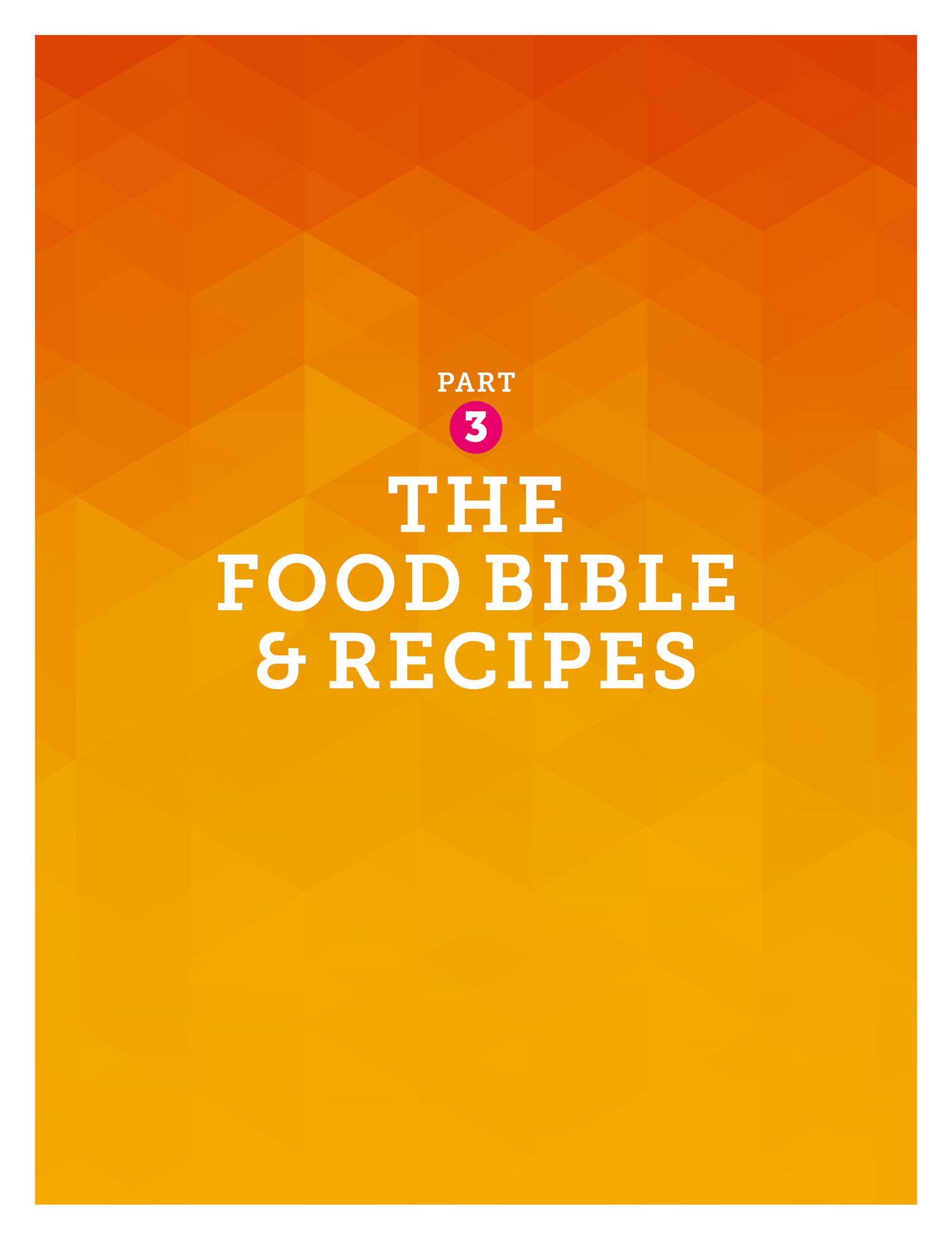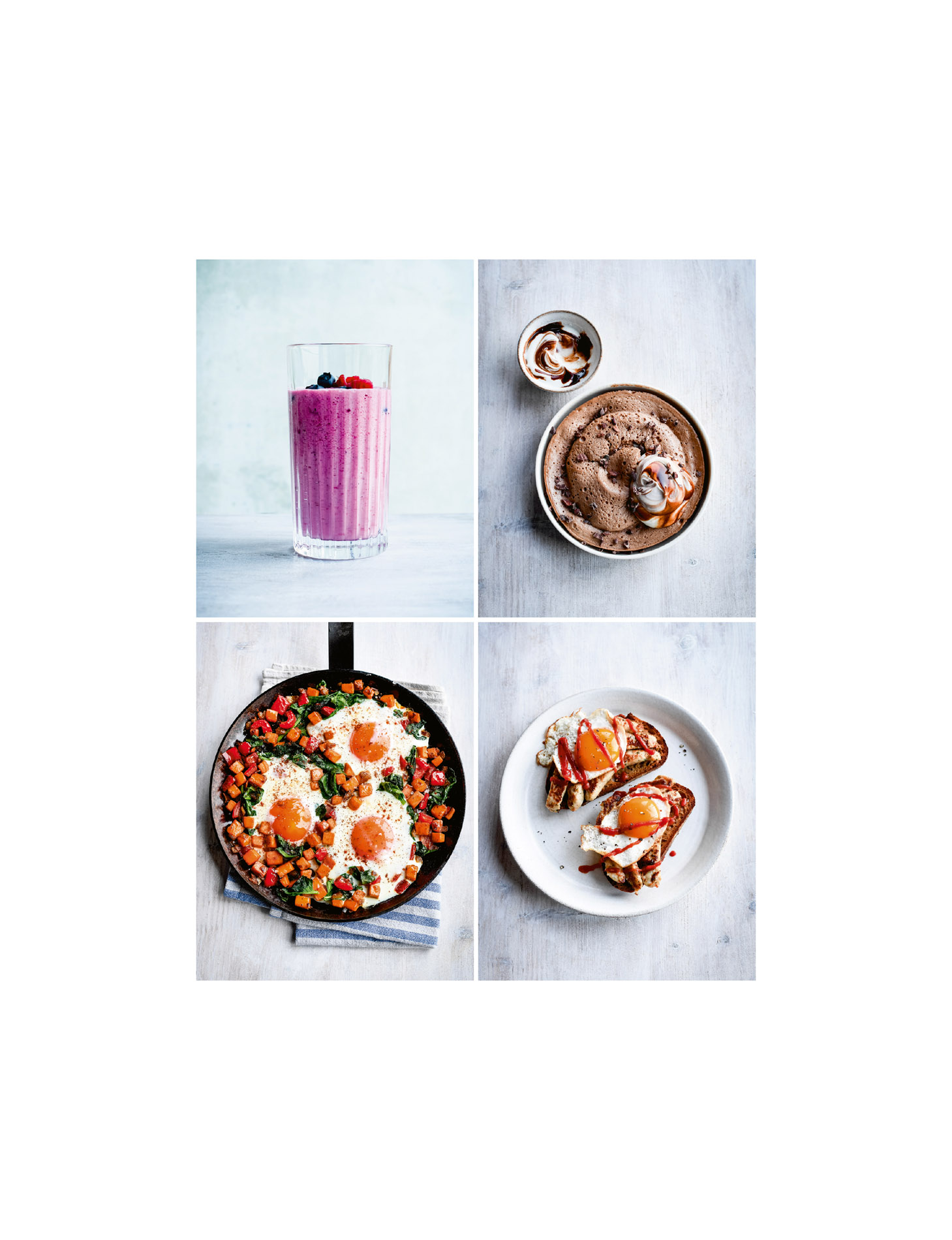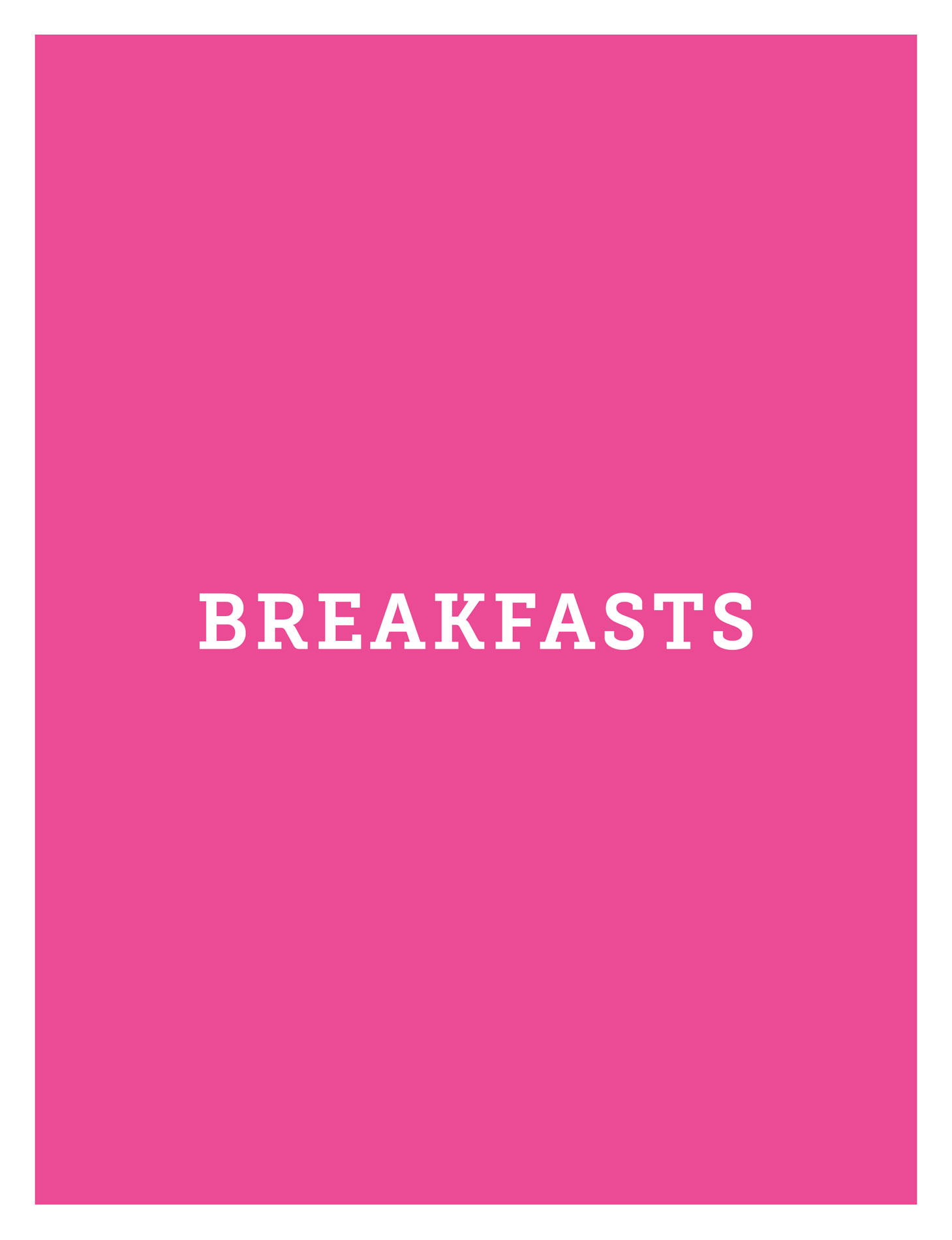
THE FOOD BIBLE
PROTEIN
Every option listed is 1 ‘standard’ portion of protein.
All proteins marked in red (*) are higher calories owing to a higher fat content. If you choose one of these as your protein portion, it will also count as your fat portion.
Anything in green (♥) is a personal brand suggestion. These suggestions are not endorsed – they are simply based on my years of tracking calories and macros and finding the most ‘bang for my buck’ foods.
DAIRY
| PROTEIN | EASE | GRAMS |
| Eat Lean Protein Cheese (♥) | 80g | 80g |
| Greek Yoghurt Plain 0% or Plain full-fat (*) |
200g pot or 200g pot (*) |
200g or 200g (*) |
| Cottage Cheese Plain fat-free or Plain full-fat (*) |
200g tub or 200g tub (*) |
200g or 200g (*) |
FISH
| PROTEIN | EASE | GRAMS |
| Cod | 1 small fillet | Approx. 120g |
| Crayfish | 1 small packet | Typically 150g |
| Haddock | 1 small fillet | Approx. 120g |
| King Scallops | 2 large | Approx. 120g |
| Lobster | 1 small | 1 small |
| Mussels | 1 small bowl | Approx. 150g |
| Prawns | 1 small packet | Approx. 150g |
| Salmon (*) Fillet or Smoked or Tinned |
1 small fillet (*) or 4 small slices or 1 small tin |
Approx. 120g (*) or Approx. 80g or Typically 105g |
| PROTEIN | EASE | GRAMS |
| Scallops | 1 small packet/bowl | Approx. 150g |
| Sole | 1 small fillet | Approx. 120g |
| Squid | 1 small packet/bowl | Approx. 150g |
| Tuna Steak or Tinned in water or brine or Tinned in sunflower or olive oil (*) |
1 small steak or 1 tin or 1 tin (*) |
Approx. 120g or Typically 110g (drained) or Typically 110g (drained) (*) |
MEAT
| PROTEIN | EASE | GRAMS |
| Beef 5% mince or 10% mince or 15% mince or Fillet steak (*) |
200g packet or 175g packet or 150g packet or 1 small (*) |
200g or 175g or 150g or Approx. 200g (*) |
| Chicken Breast (skinless/boneless) or Chipolatas (Heck Chicken Chipolatas) (♥) |
1 breast or 3 chipolatas |
Approx. 125g |
| Duck (skinless/boneless) (*) |
1 small breast (*) | Approx. 125g (*) |
| Pork Bacon Sausage |
2 slices 1 sausage 2 sausages (*) |
|
| Turkey Bacon or Breast (skinless/boneless) or Breast Mince |
3 slices or 1 small breast or 100g packet |
Approx. 125g or 100g |
OTHER
| PROTEIN | EASE | GRAMS |
| Eggs | 2 small or 4 small (*) |
|
| Egg Whites | 8 large or 300g |
Approx. 300g |
| Quorn (mince/pieces) Quorn (♥) |
100g | 100g |
| Soy (Tofu etc) |
100g packet | 100g |
| Soy Yoghurt (Plain) |
300g pot | 300g |
| Whey Protein Powder | 1 serving | Typically 25–30g |
Remember that protein is the macro that will mend the muscle tissue you have torn in training. It is vital to recovery and physique results.
FAT
Every option listed is 1 ‘standard’ portion of fat. Don’t forget that your specific fat requirements will depend on your specific aesthetic goal (see pages 174–183, 180–7 and 184–191).
All fats marked in red (*) are higher calorie owing to a higher protein content. If you choose one of these as your fat portion, it will also count as your protein portion.
Anything in green (♥) is a personal brand suggestion. These suggestions are not endorsed – they are simply based on my years of tracking calories and macros and finding the most ‘bang for my buck’ foods.
While protein and carbs have 4kcals per 1g, fats have more than double that – 9kcals per 1g. For this reason, you want to make sure you consume fats in moderation, while remembering that they are a macronutrient and are pivotal to the health and function of the human body.
DAIRY
| FAT | EASE | GRAMS |
| Brie | 2 knife smears | Approx. 40g |
| Butter | 1 level tbsp | Approx. 15g |
| Camembert | 2 knife smears | Approx. 40g |
| Cheddar | 1 small handful of grated | Approx. 30g |
| Cottage Cheese Full-fat |
100g tub or 200g tub (*) |
100g or 200g (*) |
| Cream Double Single Soured |
2 level tbsp 4 level tbsp 4 level tbsp |
Approx. 30ml Approx. 60ml Approx. 60ml |
| Cream Cheese Full-fat |
2 level tbsp | Approx. 30g |
| FAT | EASE | GRAMS |
| Edam | 1 small handful of grated | Approx. 30g |
| Emmental | 1 small handful of grated | Approx. 30g |
| Feta | 1 small handful of crumbled | Approx. 30g |
| Halloumi | 1 slice | Typically 30g |
| Mozzarella | 1 small handful of torn or grated | Approx. 30g |
| Parmesan | 2 level tbsp of grated | Approx. 30g |
| Yoghurt Plain Greek full-fat Fage (♥) |
100g pot or 200g pot (*) |
100g or 200g (*) |
FISH
| FAT | EASE | GRAMS |
| Mackerel (*) | 1 fillet (*) | Typically 100g (*) |
| Salmon Fillet (*) or Smoked or Tinned |
1 small fillet (*) or 4 small slices or 1 small tin |
Approx. 120g (*) or Approx. 80g or Typically 105g |
| Sardines (*) | 2 small (*) | Typically 110g (*) |
| Tinned Tuna in sunflower or olive oil (*) |
1 tin (*) | Typically 110g (drained) (*) |
MEAT
| FAT | EASE | GRAMS |
| Beef 5% mince or 10% mince or 15% mince or Fillet steak (*) |
200g packet or 175g packet or 150g packet or 1 small (*) |
200g or 175g or 150g or Approx. 200g (*) |
| Pork Bacon Sausage |
2 slices 1 sausage 2 sausages (*) |
Approx. 30g |
OTHER
| FAT | EASE | GRAMS |
| Avocado | ½ small | Approx. 60g |
| Cacao Nibs | 1 level tbsp | Approx. 15g |
| Chocolate (90% cocoa solids) |
2 squares | Approx. 25g |
| Eggs | 2 small or 4 small (*) |
|
| Mayonnaise | 1 level tbsp | Approx.15g |
| Nuts (all) | 1 small palm size | Approx. 20g |
| Nut butters Peanut Meridian (♥) Almond Meridian (♥) Cashew Meridian (♥) |
1 level tbsp | Approx. 15g |
| FAT | EASE | GRAMS |
| Hummus | 2 level tbsp | Approx. 30g |
| Oil (all) | 1 level tbsp | Approx. 15g |
| Olives (all) | 1 handful | Approx. 75g |
| Pesto (all) | 1 level tbsp | Approx. 15g |
| Seeds (all) | 1 small palm size | Approx. 20g |
| Tahini Meridian (♥) |
1 level tbsp | Approx. 15g |
CARBOHYDRATES
Every option listed is 1 ‘standard’ portion of carbohydrate. Don’t forget that your specific carbohydrate requirements will depend on your specific aesthetic goal (see pages 170–9, 180–3 and 184–7).
Anything in green (♥) is a personal brand suggestion. These suggestions are not endorsed – they are simply based on my years of tracking calories and macros and finding the most ‘bang for my buck’ foods.
FRUITS/STARCHY VEG
| CARBOHYDRATE | EASE | GRAMS |
| Fruit (any) |
1 small portion | Approx. 50g |
| Legumes and all pulses (beans/peas/lentils etc.) |
¼ tin | Approx. 100g |
| Potatoes and all starchy veg (parsnips/plantain/pumpkin/ peas/corn etc.) |
1 small serving | Approx. 150g |
GRAINS/PASTA
| CARBOHYDRATE | EASE | GRAMS |
| Couscous | 1 small bowl | Approx. 40g (dry) or Approx. 100g (cooked) |
| Granola (any Plain) |
1 handful (dry) |
Approx. 30g (dry) |
| Muesli (any Plain) |
1 small bowl (dry) |
Approx. 30g (dry) |
| Oats (any Plain) |
3 level tbsp or 1 small bowl (dry) |
Approx. 30g (dry) |
| Pasta (Wholegrain) |
1 small bowl | Approx. 40g (dry) or Approx. 80g (cooked) |
| Popcorn (Plain) |
1 small bag or 2 large handfuls or 25g kernels |
Approx. 25g |
| Puffed Rice Cereal (any Plain) |
1 small bowl (dry) |
Approx. 30g (dry) |
| CARBOHYDRATE | EASE | GRAMS |
| Quinoa | 1 small bowl | Approx. 40g (dry) or Approx. 100g (cooked) |
| Rice (Wholegrain) |
1 small bowl | Approx. 40g (dry) or Approx. 80g (cooked) |
| Rice Cakes | 3 rice cakes | Approx. 10g each |
| Taco Shells | 2 shells | Approx. 15g each |
| Weetabix (Plain) (♥) |
2 biscuits | Approx. 40g (♥) |
BREADS
| CARBOHYDRATE | EASE | GRAMS |
| Bagel (Plain wholegrain) |
½ normal or 1 thin |
Approx. 45g or Approx. 45g |
| Bread (any wholegrain) |
1 slice | Approx. 40–50g |
| Crumpet (any) |
1 normal or 2 thin |
Approx. 55g or Approx. 50g |
| English Muffin | 1 small | Approx. 60g |
| Pitta Bread (any wholegrain) |
1 standard size | Approx. 50g |
| Scotch/American Pancake (any plain) |
1 small | Approx. 40g |
| Tortilla Wrap (Plain small wholegrain) |
1 small | Approx. 40g |
OTHER
| CARBOHYDRATE | EASE | GRAMS |
| Honey | 2 tbsp | Approx. 30g |
VEGETABLES
Try to include non-starchy vegetables in all of your meals as they are essential to both your internal and external health.
Vegetables contain micronutrients, aka vitamins and minerals, that our bodies need to survive and maintain optimum health – not to mention other pivotal substances such as fibre.
Veg are very low calorie and, due to their high fibre content, will keep you feeling fuller for longer. This particular point is one to keep in mind if you are in a fat-loss phase specifically.
I have listed the most common non-starchy veg. However, if there are any missing from the below list, the same rules apply:
1 ‘standard’ portion = 1 large handful
» All green leaves (lettuce/spinach/rocket etc.)
» Asparagus
» Aubergine
» Bean Sprouts
» Beetroot
» Broccoli
» Cabbage (savoy/white/red/kale/brussels sprouts/pak choi etc.)
» Cauliflower
» Celery
» Courgette
» Cucumber (fresh/pickled etc.)
» Green Beans
» Leeks
» Mushrooms (any)
» Okra
» Onions (white/red/pickled etc)
» Peppers (any)
» Radishes
» Tomatoes (cherry/vine/plum/chopped/tinned/passata etc.)
ADDITIONS TO MEALS AND SNACKS
Your meals and / or snacks never have to be bland.
Feel free to use any of the ingredients listed below in or alongside your meals and / or snacks.
All green (♥) notes are my personal brand suggestions. These suggestions are not endorsed – they are simply based on my years of tracking calories and macros and finding the most ‘bang for my buck’ foods.
Additions to meals
» Fry Light cooking spray (any)♥
» salt/pepper/herbs/spices
» chilli peppers (any)
» 1 tsp lemon / lime juice
» 1 clove garlic / 1 tsp chopped garlic
» 1 tsp soy sauce (any)
» 1 tsp reduced sugar ketchup
» 1 tsp vinegar (any)
» 1 tsp mustard (any)
» 1 stock cube (any)
» 1 tsp gravy granules (any)
» 1 tsp hot sauce Tabasco (♥)
» 1 tsp Sweet Freedom Choc Shot (any) (♥)
» 1 tsp sugar-free syrup (any)
DRINKS
I want women who follow this book to be aiming to drink 4 litres of water daily. Men should be aiming for 5 litres daily.
However, please feel free to work your way up to this amount over a period of weeks if you need to.
I recommend allowing yourself a couple of hot drinks in the morning, while sipping on a 1-litre bottle of water into the early afternoon. Repeat this process mid-afternoon into early evening and, hey presto, you have achieved your water intake for the day.
Drinks marked in red (*) count towards your daily water intake.
| DRINK | PORTION |
| Diet Drinks | 1 daily |
| Caffeinated Hot Drinks (Tea / Coffee etc.) | Up to 2 daily (morning/afternoon) |
| Decaffeinated Hot Drinks (Decaffeinated Coffee / Herbal Tea etc.) (*) | Unlimited |
| Dairy Milk (any) OR Non-dairy Milks (any) | 1 tbsp to be used in your 2 daily caffeinated hot drinks |
SUPPLEMENTS
I recommend that you try to get 100% of your nutritional needs from the food that you eat. However, there are benefits to taking a few specific supplements.
Here is my list of recommendations:
» Protein Supplements
I have a sweet tooth and protein is my dominant macro, no matter what phase I am in (fat loss or muscle building). Because of this, I usually have 1 protein supplement a day, be it a bar or a powder – usually a bar immediately post-workout to get some protein in my body ASAP, or I make protein mug cake late at night (protein + water + 2 minutes in the microwave) to ease my sweet tooth.
If you have a fat loss goal, try to go for the lower calorie, lower carb, lower fat protein sups that have a good hit of whey (a great complete protein source).
If you have a muscle building or strength goal, you have a bit more choice and freedom when selecting your protein supplements. Mass gainers can be really useful when it comes to hitting high calorie, high protein and high carb requirements, especially around training (pre and post), and there are some great supplemental foods on the market too.
» Multivitamins
Micronutrients are the vitamins and minerals that our bodies need in order to survive and maintain optimum physical health. You should be getting these micros from your daily food intake, but most people are deficient in a few. Taking a good-quality, clinically trialled multivit can have a hugely positive impact on both your internal and external health.
» Omega Oils
I take omega oils daily after all my meals. They reduce inflammation (which is perfect for those who train hard) and support organ health. I saw my digestion improve when I began taking them. In my opinion, these sups are a daily must.
» Probiotics
Although it was recently proven that dairy has little-to-no impact on your gut health, clinically trialled probiotic pills have been proven to have a huge impact on your gut health and immune system. Start small – don’t go for something extra strength and don’t exceed the recommended dosage, as your GI tract can take a little while to adjust to probiotics.
» BCAAs (Branch Chain Amino Acids)
BCAAs (branch chain amino acids – aka complete proteins) are appropriate for those with fat loss, muscle building and / or strength goals. Pre-, intra-and/or post-workout, this supplement can help protect your muscle when you’re working at 100%. It will also optimise recovery.
They’re also a great option for those of you who like sugary drinks, as they come in flavoured powder form to mix with water.
» Creatine
This supplement is ideal for those wanting to build muscle and is good for strength training fans as well. Creatine can give your muscles that added oomph when it comes to training, improving high-intensity performance and encouraging muscle growth.
This is NOT a steroid and it will NOT make you ‘bulky’. It is a substance that occurs naturally in our bodies and taking a daily supplement of creatine can greatly improve your strength training.
» Caffeine
A strong cup of coffee will do just as well, but if you want a pre-workout energy boost, ‘pre-workouts’ can help with this.
However, try to find one that has been tested by Informed-Sport (a global quality assurance programme for sports nutrition products), this way, you’re reducing the risk of a crazy buzz (it may sound fun but, believe me, it does not give you a better training session!).
» CBD
Cannabidiol is a natural, non-psychoactive, safe and very much legal compound that comes from the hemp plant.
CBD impacts the human body’s endocannabinoid system, affecting the central nervous and immune systems, easing inflammation, pain, oxidative stress, physical stress, mental stress and even nausea.
CBD comes in oil, powder and pill form and is usually (although not always) recommended as a single dose in the morning and evening. This product is very new to the supplement market but, so far, it is very highly rated among both the health and fitness and longevity communities.

